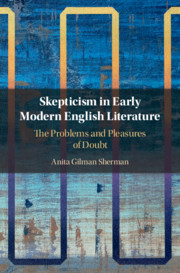Book contents
- Skepticism in Early Modern English Literature
- Skepticism in Early Modern English Literature
- Copyright page
- Dedication
- Contents
- Acknowledgments
- Introduction
- Chapter 1 Visionary, Interrupted
- Chapter 2 Fantasies of Private Language
- Chapter 3 Conformity / Neutrality in Lord Herbert of Cherbury
- Chapter 4 The Skeptical Fancies of Margaret Cavendish
- Chapter 5 The Enchantments of Andrew Marvell
- Afterword
- Bibliography
- Index
Chapter 5 - The Enchantments of Andrew Marvell
Skepticism and Taste
Published online by Cambridge University Press: 16 April 2021
- Skepticism in Early Modern English Literature
- Skepticism in Early Modern English Literature
- Copyright page
- Dedication
- Contents
- Acknowledgments
- Introduction
- Chapter 1 Visionary, Interrupted
- Chapter 2 Fantasies of Private Language
- Chapter 3 Conformity / Neutrality in Lord Herbert of Cherbury
- Chapter 4 The Skeptical Fancies of Margaret Cavendish
- Chapter 5 The Enchantments of Andrew Marvell
- Afterword
- Bibliography
- Index
Summary
This chapter argues that Andrew Marvell’s skepticism hones an aesthetic sensibility attuned to the sublime effects of fluctuating appearances, a skeptical apprehension of the sublime that contributes to the budding culture of taste. Giorgio Agamben supports the linking of skepticism and aesthetics since he sees taste as “an excessive sense, situated at the very limit of knowledge and pleasure,” explaining that “aesthetics takes as its object a knowledge that is not known” (2017, 51, 66). Marvell’s lyric poetry demonstrates the aesthetic pleasures afforded by a skeptical sensibility, even as it charts the emergence of the aesthete from the godly individual struggling to understand radical historical change and his role in the divine plan. Certain poems explore the intersections of secular and kairotic time, terms borrowed from Charles Taylor. His spectator poems show how the problematics of vision become secularized. If the deceptions of the eye in prior decades elicited the correction of both religious reformers and the early scientific establishment, here the wayward gaze is no longer an obstacle to truthful perception, but rather an occasion for enchantment.
- Type
- Chapter
- Information
- Skepticism in Early Modern English LiteratureThe Problems and Pleasures of Doubt, pp. 176 - 224Publisher: Cambridge University PressPrint publication year: 2021



